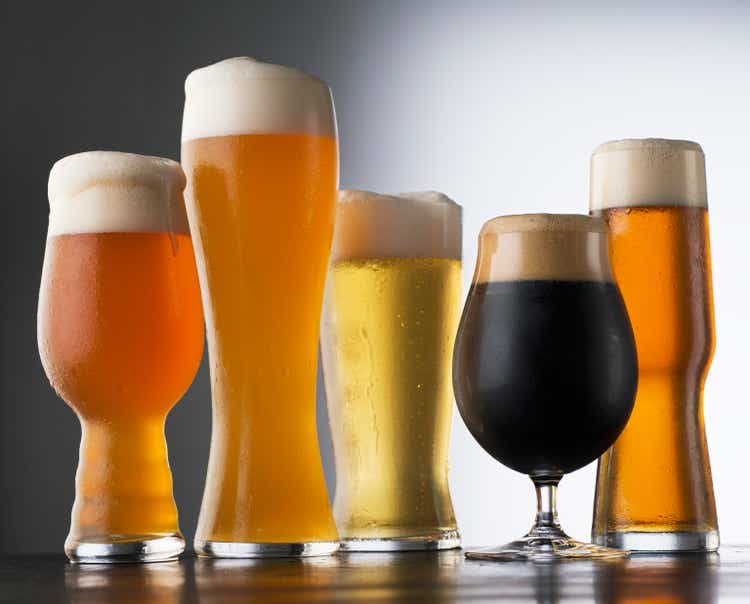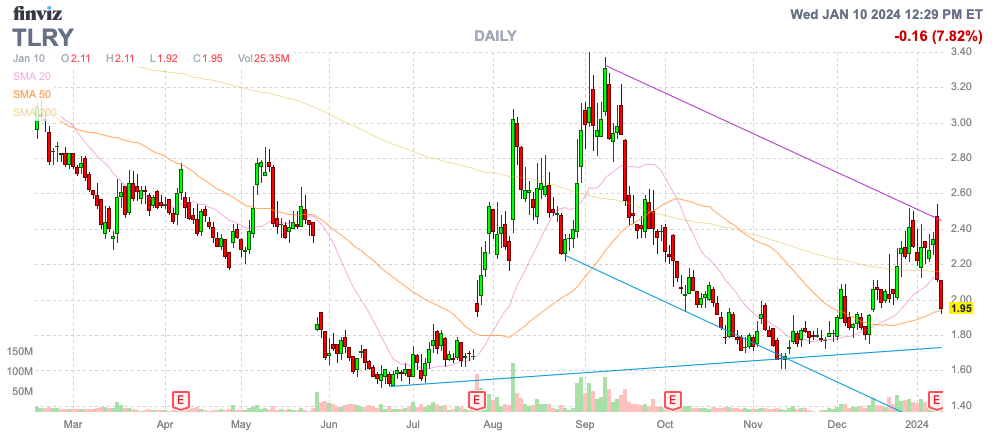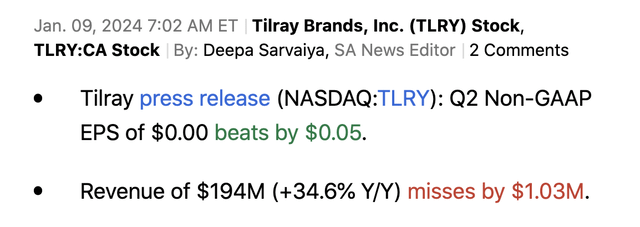Summary:
- Tilray Brands, Inc.’s growth is driven by acquisitions, not organic growth in the cannabis business.
- The company’s focus has shifted towards beverages, with recent acquisitions from Anheuser-Busch.
- Tilray Brands stock offers limited value, with Tilray needing to hit aggressive adjusted EBITDA targets before investors will gain any confidence the business can be managed.
Jack Andersen/DigitalVision via Getty Images
Tilray Brands, Inc. (NASDAQ:TLRY) reported another quarter where growth was all about acquisitions and not actually growing the cannabis business. The company has long struggled to report any consistent growth and the business is now virtually a non-cannabis operation with the new focus on beverages. My investment thesis remains Neutral on the stock following the fiscal FQ2 results, with Tilray shares dipping back below $2.
Source: Finviz
Another Confusing Quarter
One of the biggest problems with the Canadian cannabis companies has been the constant flow of acquisitions leading to the company going nowhere. In fact, a company like Tilray has always appeared to struggle managing a far-flung business with cannabis operations in Canada, a wellness business in the U.S., and global cannabis operations, with none of them providing an anchor.
During the just reported quarter, Tilray acquired multiple craft beer brands from Anheuser-Busch (BUD), including Shock Top and Breckenridge Brewery. The deals were predicted to add $250 million in pro-forma sales annually, and the quarter ended November 30 should include roughly 2 months’ worth of sales from the new beverage alcohol businesses.
Tilray reported FQ2’24 revenues of $194 million, up 34% from last FQ2, as follows:
The reported numbers look impressive, but Tilray acquired HEXO and Truss last year. In addition, the FQ4 ’23 revenues were $184 million before dipping to $177 million the prior quarter.
While the segment revenues how solid YoY growth in all categories, the numbers actually didn’t increase from the August quarter. Cannabis revenue dipped from $71 million in FQ1 to $67 million in the last quarter and Wellness revenues were down $0.5 million sequentially, while the Beverage alcohol business grew from $24 million to $47 million.
Source: Tilray Brands FQ2’24 earnings release
In essence, the Beverage alcohol business grew by slightly above $22 million in the quarter while Tilray revenues were up just $18 million. The total revenues were only $12 million above the FQ4 numbers suggesting the non-beverage segments have lost $10 million in quarterly sales in the last 6 months.
The new Beverage alcohol business needs a lot of work when Tilray should be focusing on improving the prime cannabis business. This beverage business saw the adjusted gross margin dip to 38% from a prior level of 52% suggesting the acquired craft beer business is struggling.
In addition, the revenue boost doesn’t appear to approximate anywhere close to the $62.5 million in quarterly pro-forma sales forecast when the deal closed with nearly 2 months of craft beer sales only boosting the Beverage alcohol business by $22 million. The amount should’ve topped $40 million, or more, but Tilray suggests high seasonality in the craft beer segment. Besides, the Beverage alcohol revenue boost included organic growth plus the Montauk deal last November.
No Value
Tilray kept guidance for FY24 adjusted EBITDA of $68 to $78 million while the company only produced $10 million in FQ2. The company has reached just $21 million in adjusted EBITDA YTD requiring over $47 million in adjusted EBITDA in the 2H of the year despite a past inability to grow and a much larger business to manage in 2024 with 8 new craft beer brands on an already diverse business.
The stock is only worth $1.4 billion here, and Tilray has net debt of ~$184 million. If Tilray was to hit the EBITDA target, the stocks trades at nearly 20x adjusted EBITDA.
The adjusted EBITDA targets appear far too aggressive, with Tilray unable to grow the bottom line over the years and the quarterly amounts have to at least double starting with FQ3.
Takeaway
The key investor takeaway is that Tilray Brands, Inc. is no longer excessively expensive, but investors have no reason to pile into the stock at $2. The company now gets as much revenues from beverages and wellness products as cannabis, while the distribution business continues to inflate revenues. Management needs to refocus the business and prove synergies exist from these far-flung segments before Tilray will ever become a viable investment.
Analyst’s Disclosure: I/we have no stock, option or similar derivative position in any of the companies mentioned, and no plans to initiate any such positions within the next 72 hours. I wrote this article myself, and it expresses my own opinions. I am not receiving compensation for it (other than from Seeking Alpha). I have no business relationship with any company whose stock is mentioned in this article.
The information contained herein is for informational purposes only. Nothing in this article should be taken as a solicitation to purchase or sell securities. Before buying or selling any stock, you should do your own research and reach your own conclusion or consult a financial advisor. Investing includes risks, including loss of principal.
Seeking Alpha’s Disclosure: Past performance is no guarantee of future results. No recommendation or advice is being given as to whether any investment is suitable for a particular investor. Any views or opinions expressed above may not reflect those of Seeking Alpha as a whole. Seeking Alpha is not a licensed securities dealer, broker or US investment adviser or investment bank. Our analysts are third party authors that include both professional investors and individual investors who may not be licensed or certified by any institute or regulatory body.
If you’d like to learn more about how to best position yourself in under valued stocks mispriced by the market to start 2024, consider joining Out Fox The Street.
The service offers a model portfolio, daily updates, trade alerts and real-time chat. Sign up now for a risk-free 2-week trial.

